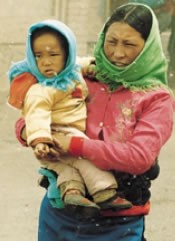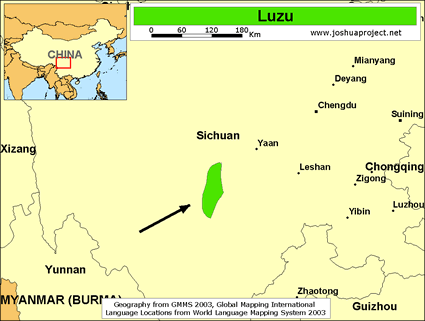The Luzu are one of numerous ethnic groups who speak a Qiangic language. In addition to the Qiang nationality presently recognized in China, smaller groups such as the Ersu, Ergong, Namuyi, Luzu, and Chrame have spread throughout southern Sichuan Province. Muli was a monastery town, presided over by a king until the 1950s. One foreign visitor to Muli commented, "The villagers occupy wooden shanties scattered over the hillsides below the town. They are very poor and live in constant fear of the lama king and his parasitic satellites."
The Luzu have been officially classified as part of the Tibetan nationality, even though their language is not related to Tibetan, and they have a distinct ethnicity. Several small ethnic groups in Muli were also classified as Tibetan, seemingly on the basis of their adherence to the Tibetan Buddhist religion rather than for ethnolinguistic reasons. One observer notes that "the Xifan [Chrame] of southwestern Sichuan [including the Luzu] ... are a member of the Tibetan minzu [nationality] but feel that they have little in common with the Tibetans."
Almost half of the families living in Muli practice either polyandry (brothers sharing a wife) or polygamy (sisters sharing a husband). These practices probably started because of the large numbers of men who join the Buddhist monkhood, thus taking a vow of celibacy. To accommodate the needs of the women, they adopted nonconventional marriages.
All Luzu are followers of Tibetan Buddhism. Every aspect of their daily lives is influenced by their beliefs. Pilgrimages to important Buddhist sites are undertaken by all Luzu at some stage of their lives.
The Luzu as a people group in China is completely unreached by the gospel. Muli is a desperately needy and vitally strategic area for evangelists and church planters to focus on with the gospel, for there are several untouched people groups living there. The Luzu will need to be visited by evangelists in order for them to hear the gospel, as shortwave gospel radio broadcasts are unable to reach the high mountains.
Without the guidance of Christ, these people are like sheep without a shepherd. They need the good shepherd in their families and communities.
Pray for the authority of Christ to bind hindering spiritual forces to lead them from darkness to light.
Pray for signs and wonders to happen among them and for great breakthroughs with a rapid multiplication of disciples and house churches.
Pray for bold workers who are driven by the love of the Holy Spirit to go to them.
Pray for an unstoppable movement to Christ among them.
Scripture Prayers for the Luzu in China.
Operation China, Asia Harvest, Copyrighted © Used with permission
| Profile Source: Joshua Project |











